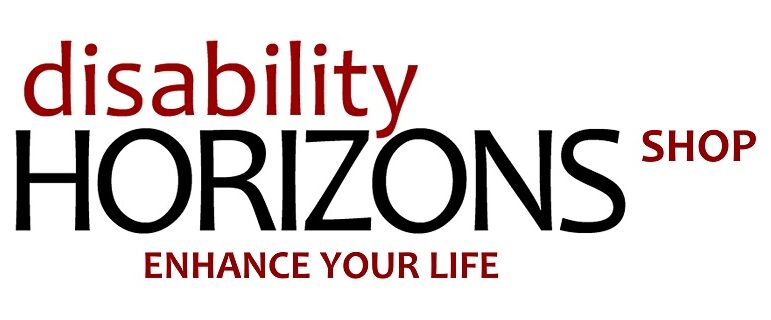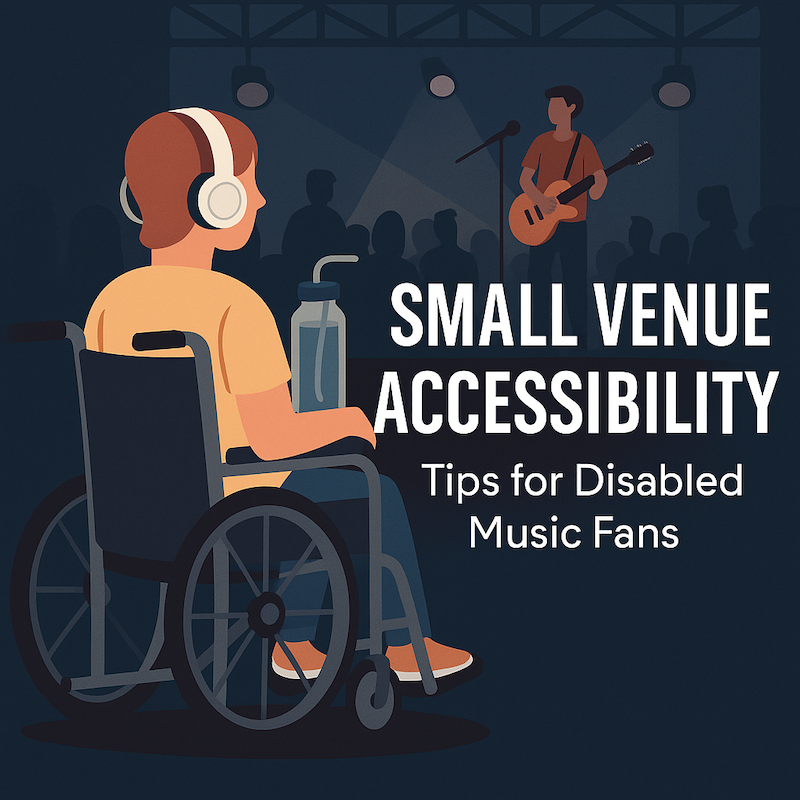There’s something magical about a sticky-floored pub gig — raw sound, close crowds, electric energy. But for disabled fans, small venue accessibility can be both a lifeline and an obstacle. Run on passion, not budgets, access often slips – a step at the door, no seating, no quiet space — yet they keep music alive.
That’s why avid disabled gig-goer, Emma Purcell, has pulled together some practical tips, drawn from her own experiences. Some are obvious, some are unconventional (and yes, sometimes against the “rules” – like sneaking in your own food). But all of them are about one thing: making sure everyone can experience the joy of live music, without compromise.
Booking tickets and checking accessibility facilities
Booking accessible tickets for live music can feel overwhelming, but careful planning makes the experience smoother and more enjoyable. Start by researching venues in advance – check their accessibility details online or contact them directly about facilities like step-free access, seating, toilets, parking, and companion tickets.
When tickets go on sale, act quickly as accessible seats are limited and often sell out fast. It’s helpful to set up an online account with the ticket provider beforehand and make sure any required documentation (like proof of disability) is ready to upload or send.
If the website isn’t clear or booking online isn’t possible, call the box office directly. Staff are often more helpful over the phone, especially for discussing your specific needs. Don’t hesitate to ask questions or request adjustments — from aisle seating to early entry or a space for mobility equipment.
Finally, always double-check your booking confirmation and keep any email correspondence. Good preparation ensures you can focus on enjoying the music, not worrying about logistics – turning what might feel like a daunting process into an empowering one.
For more advice on booking accessible tickets, check out my blogs: Top tips for booking accessible tickets at live music events & The mission of booking accessible tickets.
Also, to make it easier to show proof of disability, why not consider applying for an Access Card provided by Nimbus Disability?
Disability essentials to bring to small venues
Depending on your needs, it is important to consider what you need to bring when attending a live music event.
For instance, as a wheelchair user myself, I tend to bring my wheelchair tray that can attach to my wheelchair in order to be able to access food and drink easily in the venue.
If your wheelchair does not come with a tray, you could consider purchasing a Trabasack wheelchair lap tray and bag. With different styles and sizes, the Trabasack has a built-in lap desk with a sturdy and steady flat surface ideal for working, eating or playing. It includes straps that can attach to any wheelchair with speed and ease. The bag can store various items such as computer devices, spare clothing, eating and drinking utensils, plus much more.
Another disability aid I always take with me when attending gigs is my Hydrant water bottle, a large reusable drinking device that can be attached to my wheelchair and includes a long straw with a bite valve, which I can access whenever needed and hands-free.
Other suggestions would be to bring a portable phone charger or charger for any communication aids, dark glasses and/or ear defenders if you’re sensitive to lights or sound, spare straws if you want to have a drink at the bar, tissues and wet wipes in case of any mess or spillages and, if you have limited access to a toilet, continence supplies such as pads, catheter devices or portable urinals.
Seating arrangements and planning exits
In many small venues, there is usually no dedicated accessible section for disabled patrons. In most cases, it is standing only, and therefore, if you have additional needs, such as being a wheelchair user or having limited mobility, you would make sure you can get to maybe the front so you can see the stage and not be crushed in the crowd.
If you do not have a wheelchair but cannot stand for long periods, you should either request a chair at the venue or ask permission to bring a foldable chair to the event.
Another thing to consider is if you need to leave frequently for personal care, need to get away from loud noises and crowds for a bit or may need to leave the event early, you may want to consider carefully where you go in the venue. It may be better to stay near the exit so you can slip out early or be nearer to the toilets in case you need to access them quickly.
If you are not sure what is best or what can be possible to fit your needs, it is best to contact the venue beforehand to discuss your requirements and find out where is best for you to be when attending the gig.
On the plus side, not having a designated disabled section means you can attend these events with multiple people. Usually, at bigger venues, you’re only allocated one disabled ticket and one companion ticket, while the rest of your party will have to sit in different locations within a venue. But with small venues, you have more flexibility as to where you sit, and you can sit alongside all your family and friends at these events.
Food and drink accessibility tips for gigs
Most music venues have a pretty clear rule: no outside food or drink allowed — you’re expected to buy everything at the bar. In theory, that’s fine, but in practice, it’s not always that simple. Bars are often up a flight of stairs, buried in a crowd, or built too high to reach from a wheelchair. And even if you can get there, the prices can be enough to make your eyes water.
So, like many disabled gig-goers, I’ve had to get a bit creative. Let’s just say a small snack tucked in a bag “for later” isn’t unheard of. It’s not about breaking rules for the sake of it – it’s about managing energy, blood sugar, or just making sure you actually enjoy the night without worrying about logistics or cost.
If you have specific dietary needs, it’s always worth contacting the venue in advance. Many will allow certain foods if what they sell isn’t suitable, though it’s frustrating that we have to ask in the first place.
The truth is, venues often still design their spaces and policies without disabled people in mind. And when that happens, we end up adapting quietly, finding our own ways to make the night work — even if it goes a little under the radar.
Parking and Transport Advice for Disabled Gig-Goers
Most small venues in the UK don’t have their own car parks, so you’ll usually need to rely on nearby public parking. This could be a multi-storey car park, a supermarket car park, or a council-run facility — and accessibility standards can vary a lot from place to place.
The best starting point is always the venue’s website, which often lists nearby parking options and any accessibility details. If the information isn’t clear, try contacting the venue directly or checking the local council’s website, where you’ll usually find maps of car parks, how many Blue Badge spaces are available, and whether charges still apply for disabled parking.
It’s also worth thinking about the distance from the car park to the venue entrance. If it’s a long walk or uphill, you might want to arrange a drop-off at the door and have someone else park the car for you. Some venues will even help with this if you let them know in advance.
If you’re travelling by public transport, planning ahead is just as important. Check where the nearest bus stop, train station, or taxi rank is, and whether they’re step-free or have lifts. Transport operators’ websites and apps, as well as local council pages, are good places to check accessibility information before you travel – it’ll save you stress on the day.
Check small venue accessibility information and reviews
Before booking tickets or setting off for a gig, it’s worth taking a few minutes to check online reviews and accessibility guides. No two venues are the same — some have brilliant step-free routes, accessible toilets, and inclusive staff, while others might have unexpected stairs, narrow doorways, or unclear policies.
Real experiences shared by other disabled gig-goers can give you a far more honest picture than a venue’s own website. They’ll help you prepare, know what to expect, and decide whether you need extra support, equipment, or time to get around. In short, a quick online check can make the difference between a stressful night and an unforgettable one.
Best places to find accessibility info and reviews
1. Euan’s Guide
Often described as “TripAdvisor for disabled access,” Euan’s Guide is packed with reviews written by disabled people, covering everything from entrances and toilets to lighting and staff attitudes. It’s one of the best places to read first-hand accounts before visiting a venue.
2. AccessAble
AccessAble provides detailed, factual access guides for thousands of UK venues. Each listing breaks down entrances, routes, lifts, toilets, parking, and more – helping you plan ahead and avoid surprises.
While not a review site, Attitude Is Everything’s Live Events Access Charter sets accessibility standards and awards venues Bronze, Silver, Gold, or Platinum ratings based on how well they meet them. Many venues also undergo mystery shopper assessments by disabled visitors, so these awards can be a good sign of a genuinely accessible space.
Check out Emma’s accessible music reviews on her blog Rock For Disability and browse her other work at Crip Life™.

